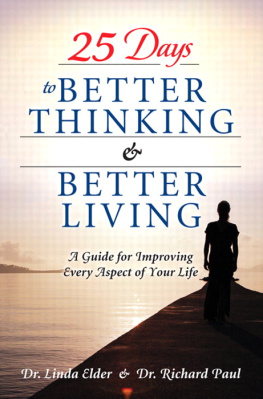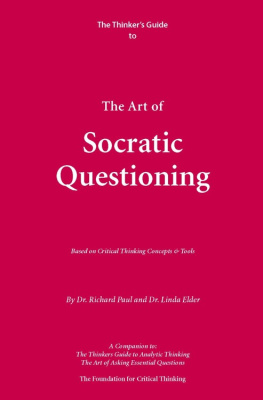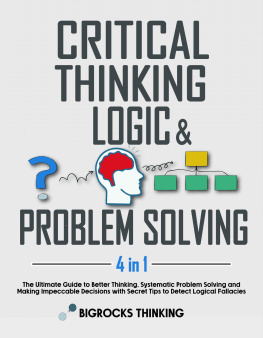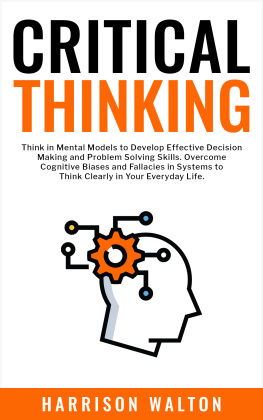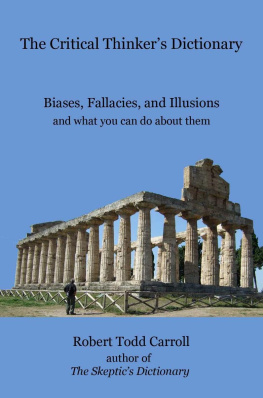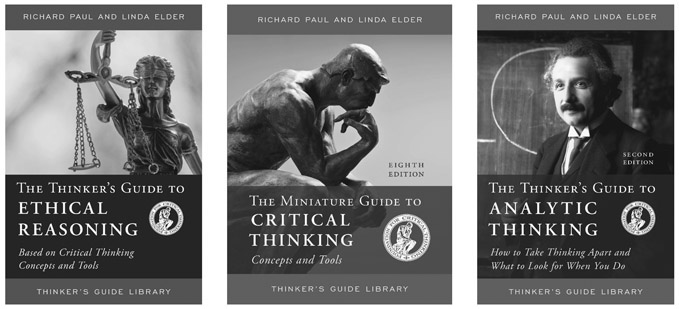The Thinkers Guide Library
Rowman & Littlefield is the proud distributor of the Thinkers Guide Library developed by the Foundation for Critical Thinking. Please visit www.rowman.com or call 1-800-462-640 for more information. Bulk order discounts available.
For Everyone
The Miniature Guide to Critical Thinking Concepts & Tools, Eighth Edition
Paperback 9781538134948
eBook 9781538134955
The Thinkers Guide to Ethical Reasoning
Paperback 9780944583173
eBook 9781538133781
The Thinkers Guide to Fallacies
Paperback 9780944583272
eBook 9781538133774
The Art of Asking Essential Questions
Paperback 9780944583166
eBook 9781538133804
The Thinkers Guide for Conscientious Citizens on How to Detect Media Bias and Propaganda in National and World News, Fourth Edition
Paperback 9780944583203
eBook 9781538133897
The Thinkers Guide to Engineering Reasoning
Paperback 9780944583333
eBook 9781538133798
The Thinkers Guide to Analytic Thinking
Paperback 9780944583197
eBook 9781538133750
The Thinkers Guide to Socratic Questioning
Paperback 9780944583319
eBook 9781538133842
The Nature and Functions of Critical & Creative Thinking
Paperback 9780944583265
eBook 9781538133958
Thinkers Guide to the Human Mind
Paperback 9780944583586
eBook 9781538133880
The Thinkers Guide to Scientific Thinking
Paperback 9780985754426
eBook 9781538133811
The Thinkers Guide to Clinical Reasoning
Paperback 9780944583425
eBook 9781538133873
For Students
The Aspiring Thinkers Guide to Critical Thinking
Paperback 9780944583418
eBook 9781538133767
The Thinkers Guide for Students on How to Study & Learn a Discipline, Second Edition
Paperback 9781632340009
eBook 9781538133835
The International Critical Thinking Reading and Writing Test, Second Edition
Paperback 9780944583326
eBook 9781538133965
The Student Guide to Historical Thinking
Paperback 9780944583463
eBook 9781538133941
How to Read a Paragraph, second edition
Paperback 9780944583494
eBook 9781538133828
How to Write a Paragraph
Paperback 9780944583227
eBook 9781538133866
For Educators
The Miniature Guide to Practical Ways for Promoting Active and Cooperative Learning, Third Edition
Paperback 9780944583135
eBook 9781538133903
A Critical Thinkers Guide to Educational Fads
Paperback 9780944583340
eBook 9781538133910
A Guide for Educators to Critical Thinking Competency Standards
Paperback 9780944583302
eBook 9781538133934
How to Improve Student Learning: 30 Practical Ideas
Paperback 9780944583555
eBook 9781538133859
The Thinkers Guide to Intellectual Standards
Paperback 9780944583395
eBook 9781538133927
The human mind is a marvelous set of structures and systems. It is a center of consciousness and action. It forms a unique identity. It creates a view of the world. Rich experience emerges from its interactions with the world. It thinks. It feels. It wants. It apprehends truths and suppresses errors. It achieves insights and fabricates prejudices. Both useful truths and harmful misconceptions are its intermixed products. It can as easily believe what is false as what is true.
It can see beauty in right conduct and justify what is flagrantly unethical. It can love and hate. It can be kind and cruel. It can advance knowledge or error. It can be intellectually humble or intellectually arrogant. It can be empathic or narrow-minded. It can be open or closed. It can achieve a permanent state of expanding knowledge or a deadening state of narrowing ignorance. It both transcends the creatures of lessor ability and insults their innocence and nobility by its self-deception and cruelty.
How can humans create within their own minds such an inconsistent amalgam of the rational and the irrational? The answer is self-deception. In fact, perhaps the most accurate and useful definition of humans is that of the self-deceiving animal. Deception, duplicity, sophistry, delusion, and hypocrisy are foundational products of human nature in its natural, untutored state. Rather than reducing these tendencies, most schooling and social influences redirect them, rendering them more sophisticated, more artful, and more obscure.
To exacerbate this problem, not only are humans instinctively self-deceptive, they are naturally sociocentric as well. Every culture and society sees itself as special and as justified in all of its basic beliefs and practices, in all its values and taboos. The arbitrary nature of its folkways is known to its anthropologists (if it has any), but not to its overwhelming majority.
The over-whelming preponderance of people have not freely decided what to believe, but, rather, have been socially conditioned (indoctrinated) into their beliefs. They are unreflective thinkers. Their minds are products of social and personal forces they neither understand, control, nor concern themselves with. Their personal beliefs are often based in prejudices. Their thinking is largely comprised of stereotypes, caricatures, oversimplifications, sweeping generalizations, illusions, delusions, rationalizations, false dilemmas, and begged questions. Their motivations are often traceable to irrational fears and attachments, personal vanity and envy, intellectual arrogance and simple-mindedness. These constructs have become a part of their identity.
Such persons are focused on what immediately affects them. They see the world through ethnocentric and nationalistic eyes. They stereotype people from other cultures. When their beliefs are questioned however unjustified those beliefs may be they feel personally attacked. When they feel threatened, they typically revert to infantile thinking and emotional counter attacks.
When their prejudices are questioned, they often feel oftended and stereotype the questioner as intolerant and prejudiced. They rely on sweeping generalizations to support their beliefs. They resent being corrected, disagreed with, or criticized. They want to be re-enforced, flattered, and made to feel important. They want to be presented with a simple-minded, black-and-white, world. They have little or no understanding of nuances, fine distinctions, or subtle points.
They want to be told who is evil and who is good. They see themselves as good. They see their enemies as evil. They want all problems to admit to a simple solution and the solution to be one they are familiar with for example, punishing those who are evil by use of force and violence. Visual images are much more powerful in their minds than abstract language. They are overly impressed by authority, power, and celebrity. They are eminently ready to be directed and controlled, as long as those doing the controlling flatter them and lead them to believe that their views are correct and insightful.
The mass media are structured to appeal to such persons. Subtle and complex issues are reduced to simplistic formulas (Get tough on crime! Three strikes and youre out! Adult crime, adult time! You are either for us or against us!) Spin is everything; substance is irrelevant.
There is a much smaller group of people who are skilled in the art of manipulation and control. These people are shrewdly focused on pursuing their own interest without respect to how that pursuit affects others. Though they share many of the characteristics of uncritical thinkers, they have qualities that separate them from uncritical persons. They have greater command of the rhetoric of persuasion. They are more sophisticated, more verbal, and generally have greater status. On average, they have more schooling and achieve more success than uncritical persons. They typically acquire more power and occupy positions of authority. They are accustomed to playing the dominant role in relationships. They know how to use the established structure of power to advance their interests. Since they are fundamentally concerned, not with advancing rational values, but with getting what they want, they are careful to present themselves as sharing the values of those they manipulate.


